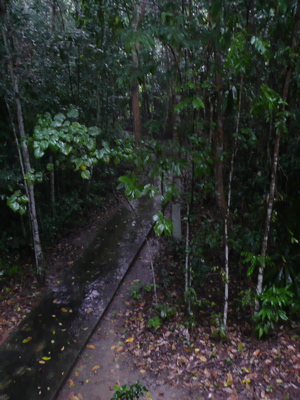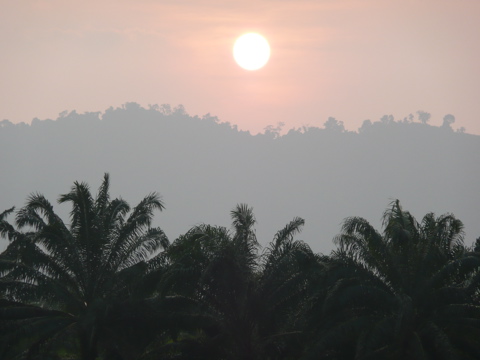Best viewed with Mac and Firefox
Scroll down for the pictures. I'll post more later...
In 2007 I stayed for some three weeks -short before the end of Vassa at Wat Boonyawad.
It is a monk's monastery (around 30 Monks live here) with no Mae Chees. Women are allowed for only about two weeks, this regulation applies even for Mae Chees. After a week of absence women may return for two weeks again.
With a private driver the journey from Bangkok takes like 2-3 hours, for farang go and back is 5600 Baht, the price for Thai is around 4000 Baht.
Than Ajahn Dtun gives at Uposatha days teachings in Thai at
about 8 PM. Apart from this are no teachings or meditation intructions at all for women. But the women can ask Than Ajahn Dtun around 10-11 o'clock, when the
visits of the laypeople are finished. He also then comes frequently to the kitchen
and Khun Suwaree or someone else translates. This is a nice opportunity. As for men it is different, as they live in the man's place slightly apart from the monks.
Daily routine for Laypeople:
3:00 a tape recorded chanting wakes you up, but it is ok to wake up at 4:30
4:30 Wake up and meditation.
6:30 Work in the kitchen, helping preparing the food for the monks
at about 7 am Laypeople from Chonburi and the towns around arrive bringing food.
8:00 Short chanting before eating for the monks and the laypeople
from 9:00 after breakfast finishes the laypeople give Dana and pay respects to
Than Ajahn.
10:00 The work in the kitchen finishes
10-11 possibility for women to talk to Than Ajahn
around 10:30 back to kuti, washing clothes, meditation
16:00 Brooming around the kuti and the ways
17:30 - 18:30 Possibility of drinking tea or coffee at the kitchen
18:30 back to Kuti
This times and regulations are fixed and called Kor Wat. Any monastry has it's own Kor Wat.
Some more details:
At around 06:45 the Monks come back from Pindabat (Almsround) and take place in the wooden Sala. The Laypeople serve food to the Monks which is transported from the most senior monk to the lesser senior monks on a tray with little wheels. As Ajahn explained he learned from Ajahn Mun that according to the tradition the food was on plates and was passed from hand to hand from one monk to the other. In Ajahn Dtuns opinion it is like as handled today in many Monasteries like Buffet.
During the week come some 15 Laypeaople, at Sunday come around 50 to 70 or even more persons, also from Bangkok.
The Laypeole have not much contact to the monks. Here are living around 30 Monks, some are foreigners as from Germany (deutscher Mönch) , from Sri Lanka, from Australia and one Phra Khaow from New Zealand.
The novice monks don't wear white robes as in other Wats, they wear directly
the coloured robes.
The Monk's Kuti are made from wood, not like the Laywomen's Kutis. The laywomen's are really nice and clean. Around the kuti's pillars is a special contruction filled with oil, so the insects don't crwal inside.
No electricity and only running cold water from a tap. No Internet, no mobile-phones, no TV, no Walkman, MP3 etc are allowed either.
The robes are dyed by the monks themselves with chopped tree wood of the Jackfruit tree.
This work is done at the day (or the day after I am not sure) of the Patimokkha Chanting. So sometimes the Laypeople offered the robes in white so the dying can be done as traditionally. The robes have a really very nice and true colour.
At for example this shop in Bangkok can be ordered the white robes:
Poneboon
26 Thanee Road( sometimes spelt Tani), Pranakorn, Bangkok 10200
Opened everyday 7:30 am to 6:30 pm.
Phone: 02-282-8262 Mobile: 086-771-6821
This shop is very near to Khao San Road, Wat Bowoniwet, Soi Rambuttri.
The owner is a chinese woman who speaks very good English.
One german monk explained me why there is also no Morning- and Evening Chanting: In Ajahns opinion this is not that necessary, the meditation practice is the most important at Wat Boonyawat. There is a short chanting or blessing before meal.
...but once at night I heard a chanting coming from the monks, this was very beautiful...
I enyoyed my time at Wat Boonyawad very much and look forward going there again...
With best regards
ShinMeiDokuJoh
Scroll down for the pictures. I'll post more later...
In 2007 I stayed for some three weeks -short before the end of Vassa at Wat Boonyawad.
It is a monk's monastery (around 30 Monks live here) with no Mae Chees. Women are allowed for only about two weeks, this regulation applies even for Mae Chees. After a week of absence women may return for two weeks again.
With a private driver the journey from Bangkok takes like 2-3 hours, for farang go and back is 5600 Baht, the price for Thai is around 4000 Baht.
Than Ajahn Dtun gives at Uposatha days teachings in Thai at
about 8 PM. Apart from this are no teachings or meditation intructions at all for women. But the women can ask Than Ajahn Dtun around 10-11 o'clock, when the
visits of the laypeople are finished. He also then comes frequently to the kitchen
and Khun Suwaree or someone else translates. This is a nice opportunity. As for men it is different, as they live in the man's place slightly apart from the monks.
Daily routine for Laypeople:
3:00 a tape recorded chanting wakes you up, but it is ok to wake up at 4:30
4:30 Wake up and meditation.
6:30 Work in the kitchen, helping preparing the food for the monks
at about 7 am Laypeople from Chonburi and the towns around arrive bringing food.
8:00 Short chanting before eating for the monks and the laypeople
from 9:00 after breakfast finishes the laypeople give Dana and pay respects to
Than Ajahn.
10:00 The work in the kitchen finishes
10-11 possibility for women to talk to Than Ajahn
around 10:30 back to kuti, washing clothes, meditation
16:00 Brooming around the kuti and the ways
17:30 - 18:30 Possibility of drinking tea or coffee at the kitchen
18:30 back to Kuti
This times and regulations are fixed and called Kor Wat. Any monastry has it's own Kor Wat.
Some more details:
At around 06:45 the Monks come back from Pindabat (Almsround) and take place in the wooden Sala. The Laypeople serve food to the Monks which is transported from the most senior monk to the lesser senior monks on a tray with little wheels. As Ajahn explained he learned from Ajahn Mun that according to the tradition the food was on plates and was passed from hand to hand from one monk to the other. In Ajahn Dtuns opinion it is like as handled today in many Monasteries like Buffet.
During the week come some 15 Laypeaople, at Sunday come around 50 to 70 or even more persons, also from Bangkok.
The Laypeole have not much contact to the monks. Here are living around 30 Monks, some are foreigners as from Germany (deutscher Mönch) , from Sri Lanka, from Australia and one Phra Khaow from New Zealand.
The novice monks don't wear white robes as in other Wats, they wear directly
the coloured robes.
The Monk's Kuti are made from wood, not like the Laywomen's Kutis. The laywomen's are really nice and clean. Around the kuti's pillars is a special contruction filled with oil, so the insects don't crwal inside.
No electricity and only running cold water from a tap. No Internet, no mobile-phones, no TV, no Walkman, MP3 etc are allowed either.
The robes are dyed by the monks themselves with chopped tree wood of the Jackfruit tree.
This work is done at the day (or the day after I am not sure) of the Patimokkha Chanting. So sometimes the Laypeople offered the robes in white so the dying can be done as traditionally. The robes have a really very nice and true colour.
At for example this shop in Bangkok can be ordered the white robes:
Poneboon
26 Thanee Road( sometimes spelt Tani), Pranakorn, Bangkok 10200
Opened everyday 7:30 am to 6:30 pm.
Phone: 02-282-8262 Mobile: 086-771-6821
This shop is very near to Khao San Road, Wat Bowoniwet, Soi Rambuttri.
The owner is a chinese woman who speaks very good English.
One german monk explained me why there is also no Morning- and Evening Chanting: In Ajahns opinion this is not that necessary, the meditation practice is the most important at Wat Boonyawat. There is a short chanting or blessing before meal.
...but once at night I heard a chanting coming from the monks, this was very beautiful...
I enyoyed my time at Wat Boonyawad very much and look forward going there again...
With best regards
ShinMeiDokuJoh
Entrance 1

Entrance

Entrance Detail

Entrance Detail 2

Entrance Lotus

Frangipani - The Templeflower

First Evening

My Kuti outside

My Kuti Inside

My Kuti Bathroom

Veranda

Walking Path Jongrom

Regulations 1

Regulations 2

Waran

Early morning, Way to kitchen

Early morning

the monks are on Pindabat. It' around 6 o'clock
Back from Pindabat

Monks coming back from Pindabat and washing feet. Monks go barefeet on Pindabat.


It is around 6:40 and still a little bit dark
Robes Sala

Khun Suwaree

Lays preparing food

In the kitchen


cooking delicious food

Food for the Monks

This was on a sunday. Many people came.

Big vareiety of food is served. Also vegetarian food.
Sweet filled pumpkin

Breakfast Serving

Serving to Than Ajahn

Phra Sudhammo

a german monk living here



The foodtrays


Some food donations are in little plastic bags

Vie from outside
Food for the laypeople

After the Monks got the food, the rest is for the laypeople.
My food

...ok this time too much....
Washing dishes

....sometimes alone...

...and sometimes with many help.
drying the dishes

Than Ajahn Dtun

visiting us in the kitchen
New Sala

here take in the afternoon the teaching for the monks place
Monks New Sala



Two Bowls
New Sala inside

Relics

here are many relicts, some are like diamonds


more relicts, they have different shapes

I am not shure, but someone told me here are also relicts of Buddha
Outside new Sala

Lay Women Kuti

... some pictures of the laywomens kutis. They are quite far apart from each other.

Plant



Early Afternoon walk

Ajahns



Ajahn in China



After breakfast Than Ajahn teaches and talks to the visitors
Mae Chee Maehm

Famous Mae Chee

Sunset

6.30 PM back to Kuti


